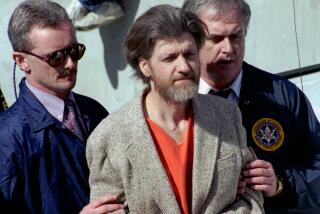Defense Seeks to Show Kaczynski Is Mentally Ill
- Share via
SACRAMENTO — Unabomber suspect Theodore Kaczynski has failed to recognize his own mental illness, which has isolated him from society, yet he craves a loving personal relationship, according to court documents filed Tuesday.
The filings by his attorneys provide a further glimpse into the mind of the former UC Berkeley mathematics professor who prosecutors allege is responsible for an 18-year series of bombings that killed three people and injured 29.
Kaczynski’s attorneys are seeking to show that their client has a paranoid schizophrenic condition that has led to his refusal to submit to an examination by government-appointed psychiatrists. A hearing on the matter is scheduled for Friday.
Last week, prosecutors said that although Kaczynski claims to have a dread of psychiatrists, he had in the past appealed in letters to mental health experts for help with insomnia.
But on Tuesday, Kaczynski’s attorneys submitted sworn statements from their own mental health experts offering a sharply contrasting view.
“In summary, reluctance to submit to psychiatric evaluations and treatment [is] a hallmark of schizophrenia,” said Dr. Xavier F. Amador, a New York clinical psychologist.
“Mr. Kaczynski’s willingness to seek help with his insomnia and social deficits has no bearing on his capacity to submit to a psychiatric evaluation. It is like comparing apples to oranges,” Amador said.
Moreover, Dr. David Foster, a psychiatrist who has interviewed Kaczynski for the defense, said prosecutors had deleted significant parts of letters Kaczynski sent to mental health clinics in the late 1980s and early 1990s.
Foster indicated that those blacked-out portions show that despite Kaczynski’s brilliance as a mathematician, he was unable to fathom his own mental illness.
“In these deleted sections, Mr. Kaczynski describes significant psychological torment . . . and describes both depression as well as insomnia resulting from his inability to comprehend the nature of his disabilities,” Foster said.
In a letter dated July 12, 1991, Foster said, Kaczynski “relates his lack of friends or social contacts. His comfort with solitude is contrasted with his longing for even a single, close, personal loving and respectful relationship.”
Foster described how Kaczynski’s paranoia about psychiatrists even hampered his own evaluation of the 55-year-old Chicago native.
“In fact, early on in our sessions,” Foster said, “he looked me in the face and said, ‘You are the enemy.’ ”
Kaczynski refused to see Foster after the doctor broached the subject of his mental symptoms.
Kaczynski’s family, whose tip led the FBI to arrest the recluse at his Montana cabin, has cited Kaczynski’s mental health as a reason he should not be executed if a jury finds him guilty.
Anthony Bisceglie, an attorney who represents Kaczynski’s brother, said Tuesday in an interview that the defense affidavits shed new light on Kaczynski’s condition.
“This is not a man who is feigning mental illness,” Bisceglie said. “This is a sick man who is feigning mental health.”
After reading a 35,000-word anti-technology Unabomber manifesto published in 1995 in the New York Times and the Washington Post, David Kaczynski suggested to the FBI that it was similar to his brother’s writings. That tip led to Theodore Kaczynski’s arrest in April 1996 at his cabin near Lincoln, Mont.
In Sacramento, Theodore Kaczynski is charged in connection with blasts that killed two capital-area men and seriously injured two others in Tiburon and New Haven, Conn. He has pleaded not guilty.
Jury selection, now in its second week, continues today.
More to Read
Sign up for Essential California
The most important California stories and recommendations in your inbox every morning.
You may occasionally receive promotional content from the Los Angeles Times.













